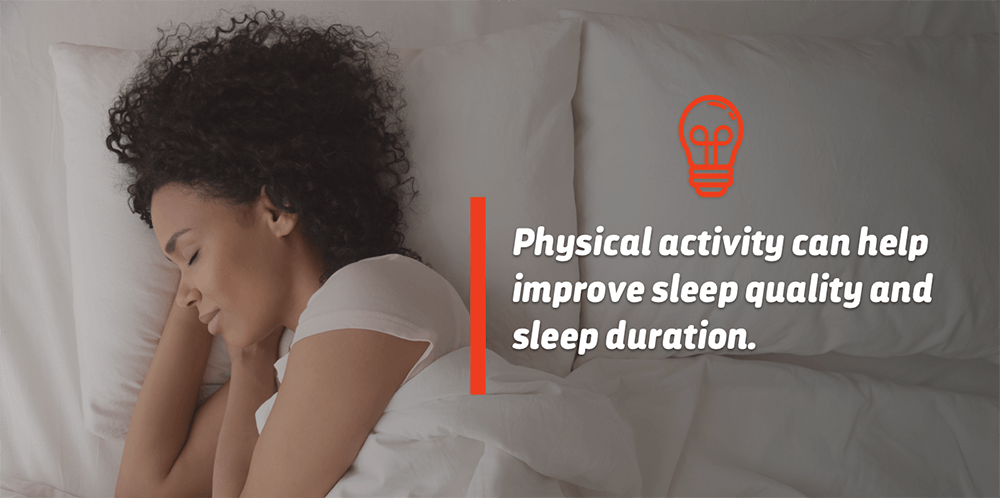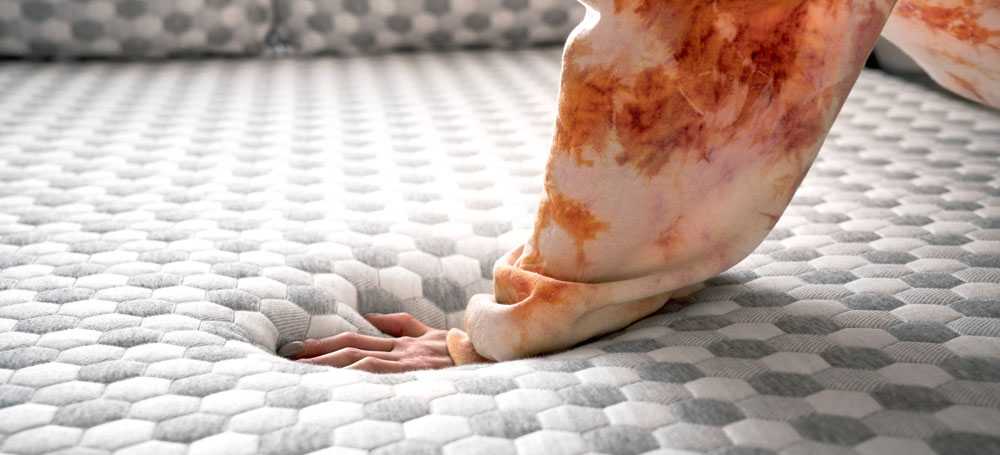Is Exercise Before Sleep Beneficial?
The short answer is yes. The benefits of exercise are far-reaching and can even extend your lifespan. Here are a few of the general health benefits of exercise:
- Weight control: If you want to keep your weight under control, expending calories through exercise is a great way to do it. Exercising often can also help raise your metabolic rate, which means maintaining a healthy weight is easier.
- Joint, bone, and muscle health: Being active helps your muscles, bone, and joints develop greater strength. Weight-bearing exercise is essential for long-term musculoskeletal health.
Reduces risk of disease: Regular exercise can help reduce the risk of diabetes, heart disease, and other lifestyle-related conditions. - Mental health boost: Exercise triggers positive neurotransmitters in the form of endorphins. In addition, you’ll feel happier and less stressed thanks to the increase in serotonin, norepinephrine, and dopamine. (There’s a reason why they call it a runner’s high!)
- Helps fight fatigue: Engaging in athletic activities increases your blood flow and overall fitness. In turn, you’ll get a burst of energy that can help fight afternoon sleepiness or even chronic fatigue conditions.
- Sleep quality: Exercising can help you get into a deeper, more restorative phase of sleep. It can also make falling asleep much easier at night.
As you can see, exercise is beneficial before sleep, but it’s crucial to time it appropriately. According to the Department of Health and Human Services, an American adult should aim for 150 minutes of exercise every week at a minimum. Or, about 30 minutes of exercise every day.
But not all exercise is equal. Exercise too late, and you can end up having a night full of tossing and turning.
When to Exercise
If you’re ready to start reaping the benefits of regular exercise, you might be curious when exercise will provide the most bang for your buck. Ultimately, your natural circadian rhythm will determine when exercise is most beneficial for your specific circumstances, but we’ve outlined some guidelines below.

Morning Workouts
For those that want the best chance of keeping a consistent sleep schedule, it’s a good idea to stick to morning workouts. In addition, if you get your workout done in the early morning, you’ll be less likely to push it off later or not do it at all. After all, the first thing to get deprioritized when you’re busy is usually exercise.
One study showed that participants who worked out on a treadmill at 7:00 am sleep longer, enjoyed a deeper sleep overall, and spent 75% more time in the most restorative stages of the sleep cycle compared to participants who didn’t.
Plus, if you exercise in the morning when the sun is out, you can get a strong dose of sunshine, which supports a natural circadian rhythm and can help you feel alert. And you’ll get a nice boost of vitamin D, too! There’s evidence that adequate vitamin D absorption has a positive effect on your sleep quality, so exercising outside provides a range of benefits.
But even if you don’t venture outside, studies suggest that morning workouts result in greater productivity, great sleep at night, and lower blood pressure. It also helps to reinforce your mindset so you can make healthier decisions throughout the day.

Afternoon Workouts
If you hate the morning, working out in the afternoons has a few benefits, too. By the time the afternoon comes around, your body is one or two degrees warmer compared to when you first wake up. As a result, your muscles are likely to work more efficiently and you’ll be better at doing more complex movements.
Just like morning workouts, afternoon workouts can also help you fall asleep more quickly and sleep more deeply at night. Sleep experts postulate this is because exercise raises your body’s temperature for four to five hours. After that, your core body temperature tends to drop as your body gets ready to go into sleep mode.
Afternoon workouts are linked to lower stress levels, better endurance, and better reaction times. So, for example, if you’re going for a PR, the afternoon might actually be your best bet.

Night Workouts
Maybe the only time you have during the day is later at night. Well, don’t worry too much – you can still make the most of it. Your endurance ability creeps up at night, so you can exercise up to 20 percent longer and at a higher intensity.
An evening workout also helps you work out any frustrations and stress you experience during the day. It provides an outlet for that energy, so when it’s time to sleep, your brain won’t be overwhelmed by nervous energy.
If you’ve acclimated your body to evening jogs or a nightly Pilates session and you’ve never experienced any sleep issues because of it, you can carry on as usual. Just make sure to give yourself plenty of time to cool down and don’t jump right into bed immediately after.
Healthy Bedtime Exercises
If you want to get some exercise in before you go to bed and it’s getting close to your bedtime, it’s best to stick to more gentle exercises. The evening isn’t necessarily the right time to try out a new intense HIIT workout or hard weightlifting routine. Instead, try these more gentle exercises for a better night of sleep:
- Yoga: Yoga is a great way to relax and unwind after a long day. A 30-minute yoga session can help you decompress and provides gentle activity for your body that won’t send your adrenaline into overdrive.
- Pilates: If you’re looking to strengthen your core, Pilates provides an excellent way to do so. A 30-minute Pilates session works out your abs, but it won’t be too intense that it keeps you up.
- Stretching: Focus on exercises where you’re sitting or lying down to avoid raising your heart rate excessively. Make sure and hold each stretch you do for at least 30 seconds and stretch both sides of your body.

Bedtime Exercise Tips
For all the night owls out there who prefer to exercise at night rather than the morning, there are a few tips you can follow to ensure that your sleep isn’t disrupted. If you work out at night, follow these guidelines:
- Give yourself a proper cooldown: If you jump straight from your exercise bike to your bed, you’re going to be struggling to sleep since your heart rate will still be high and your mind will remain alert. A proper cooldown will help bring your breathing levels and heart rate down.
- Take a cold shower: If you can handle a cold shower, it’s a great way to lower your core body temperature. A cooler body temperature helps signal to the rest of your body that it’s time to go to sleep.
- Slow down your breathing with meditation: Sit on a yoga mat or towel after your shower. Try to practice deep-breathing techniques while sitting in a comfortable position for 5-10 minutes. Doing so will help your body relax and calm down from your workout.
- Use a calming supplement: Spray some diluted lavender essential oils on your pillow or drink a chamomile tea to help your body feel sleepy after exercise.
Preparing your body for sleep is essential for a variety of reasons. Sleep is important because not only does it help you feel refreshed in the morning, but it also helps your body repair tissue and build muscle after you crush your daily workout or exercise. So, how much sleep do you need? Experts recommend at least eight hours, but it also depends on your age. Setting up a schedule that allows you to get consistent sleep every night can do you body wonders.
Takeaways: Exercise strategically for your best sleep
Although exercise provides a great boost for your overall health, it can keep you awake at night if you work up a sweat before hitting the hay. With that said, some night owls out there won’t be as affected by evening workouts as others. There’s no one-size-fits-all when it comes to exercising before bed. However, if you’re struggling to sleep and you’ve been working out late in the day, that might be the reason why. Try working out in the morning or afternoon to see if that improves your sleep quality and duration.
If you’re still having issues sleeping, it’s important to investigate other variables. For example, do you have good sleep hygiene? Is your bed comfortable? If not, it might be time to invest in a hybrid mattress or a memory foam mattress. Both of these mattresses boast copper cooling technology. For individuals who exercise late at night, that cooling copper can help your body get rid of excess heat, so you can sleep comfortably throughout the night.



